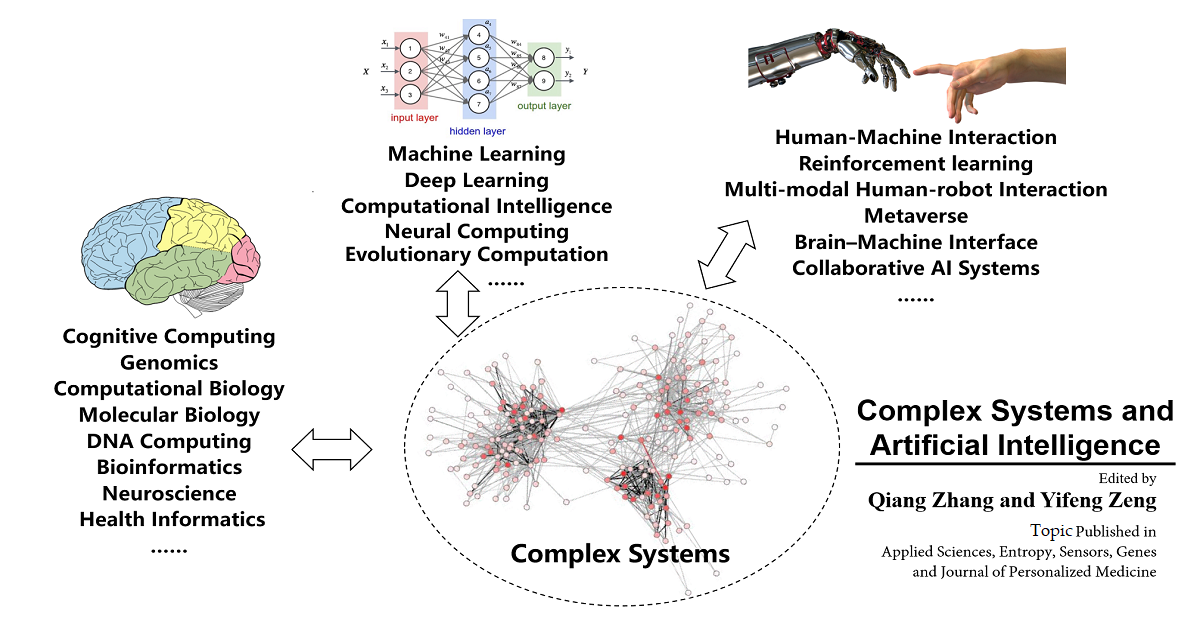Topic Menu
► Topic MenuTopic Editors

Complex Systems and Artificial Intelligence

Topic Information
Dear Colleagues,
Due to the rapid development of algorithms, frameworks, hardware, networks, and the increased volume of data, artificial intelligence (AI) algorithms (e.g., deep learning, neural computing, biological computing, etc.) have been widely employed to solve problems in many complex systems. AI-based techniques and emerging new computing paradigms could extract sophisticated features and help us to address the practical problems that occur in complex systems more easily. For example, DNA computing—an emerging branch of biological computing—uses DNA, biochemistry, and molecular biology hardware to overcome the limitations of traditional electronic computing architecture in storing technologies, synthetic controllers and reaction networks, etc.
This Topic aims to highlight and present the latest developments in complex systems and artificial intelligence, addressing the challenge of how to apply advanced artificial intelligence algorithms, frameworks, and technologies to complex systems for a better world. Research fields could include industry, traffic, biology, agriculture, economy, environment, management, etc.
Contributions will focus on challenging issues in the field of complex systems and artificial intelligence technologies, frameworks, architectures, algorithms, and applications. Both theoretical and experimental contributions containing novel applications with new insights and findings in the field of complex systems and artificial intelligence are welcome. Review articles detailing the current state of the art are also encouraged. Topics of interest include, but are not limited to, the following:
- Complex evolutionary and adaptive systems;
- Self-organizing collective systems;
- AI-driven problem solving for complex systems;
- Machine learning for complex systems;
- Deep learning for complex systems;
- Neural computing for complex systems;
- Multi-agent for complex systems;
- Knowledge graph for complex systems;
- Data-driven AI for complex systems;
- Feature extraction and optimization;
- Multimodal feature fusion for complex systems;
- Biological computing for complex systems;
- AI in networks;
- AI and optimization problems;
- AI-based sensing, decision, and control for complex systems…
Prof. Dr. Qiang Zhang
Prof. Dr. Yifeng Zeng
Topic Editors
Keywords
- artificial intelligence
- complex systems
- computational intelligence
- data-driven artificial intelligence
- cognitive computing
- evolutionary computation
- bio-inspired algorithms
- reinforcement learning
- human–machine shared control
- multi-modal human-robot interaction
- Metaverse
- knowledge acquisition
- information fusion
- computational biology
- molecular biology
- genomics
- DNA Computing
- bioinformatics
- health informatics
- feature extraction
- neuroscience and cognitive science
- multi-objective game theory
- data-driven AI
- machine learning
- complex evolutionary
- brain–computer interface
- brain–machine interface
- human-machine interaction
- human–computer interaction
- system modelling
- deep learning
- signal processing
- computer vision
- image processing
- speech processing
- vedio processing
- audio processing
- neural computing
- random systems
- hybrid AI models
- collaborative AI systems
- large-scale system
Participating Journals
| Journal Name | Impact Factor | CiteScore | Launched Year | First Decision (median) | APC |
|---|---|---|---|---|---|

Applied Sciences
|
2.5 | 5.5 | 2011 | 16 Days | CHF 2400 |

Entropy
|
2.0 | 5.2 | 1999 | 21.5 Days | CHF 2600 |

Sensors
|
3.5 | 8.2 | 2001 | 17.8 Days | CHF 2600 |

Genes
|
2.8 | 5.5 | 2010 | 14.6 Days | CHF 2600 |

Journal of Personalized Medicine
|
- | 6.0 | 2011 | 25 Days | CHF 2600 |

Preprints.org is a multidisciplinary platform offering a preprint service designed to facilitate the early sharing of your research. It supports and empowers your research journey from the very beginning.
MDPI Topics is collaborating with Preprints.org and has established a direct connection between MDPI journals and the platform. Authors are encouraged to take advantage of this opportunity by posting their preprints at Preprints.org prior to publication:
- Share your research immediately: disseminate your ideas prior to publication and establish priority for your work.
- Safeguard your intellectual contribution: Protect your ideas with a time-stamped preprint that serves as proof of your research timeline.
- Boost visibility and impact: Increase the reach and influence of your research by making it accessible to a global audience.
- Gain early feedback: Receive valuable input and insights from peers before submitting to a journal.
- Ensure broad indexing: Web of Science (Preprint Citation Index), Google Scholar, Crossref, SHARE, PrePubMed, Scilit and Europe PMC.


